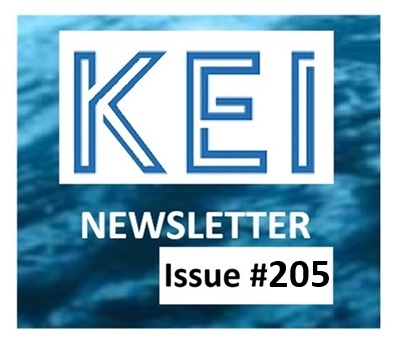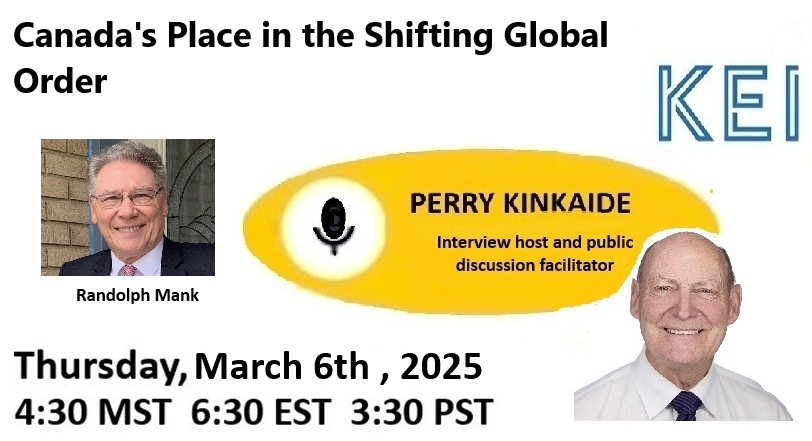|
Covid-19 Mis-mangement - webinar recording |
DIRECTORY | ||
|
Contributions: |
Action:
|
Fact or Fiction:
AI is ethical - really? |
|
|
Editor - Perry Kinkaide |
In today’s world, trust is elusive. Media twists reality, social platforms amplify outrage, and bluster often overshadows substance. Negotiation is no different—bluffing thrives when emotions rule. But results, not rhetoric, determine success.
To avoid being misled, focus on the chessboard, not the player. Ignore theatrics, demand facts, and assess actions over words. Bluffers rely on distraction, exaggeration, and intimidation. The best defense? Stay clear-eyed, ask tough questions, and insist on verifiable commitments.
In an era where deception is a tool of influence, effective negotiators cut through noise and hold firm to reality. They don’t react to style; they measure results. - Editor
|
||
|
The following Opinion Editorial was written before Fridays dust-up in the Oval Office between the Presidents of te Ukraine and the United States. Consider whether the perspective still holds. - Editor Why "Hug the Bear" - A Pragmatic Perspective for NATO and Canada Donald Trump’s approach to foreign policy, particularly his efforts to reconfigure relations with Russia, has been met with both alarm and intrigue. The reaction from analysts such as Terry Glavin HERE in the National Post has been largely negative, characterizing Trump’s overtures as reckless, compromising NATO’s stability, and endangering the security architecture that has defined the post-Cold War order. However, a more pragmatic and measured reassessment suggests that Trump’s initiative, rather than being a naive capitulation to Vladimir Putin, could in fact serve to re-calibrate global geopolitics in a manner beneficial to NATO allies, including Canada, and bring about a new global order. Challenging the Reflexive Skepticism. Terry Glavin's critique largely mirrors conventional wisdom, which assumes that any thawing of relations with Russia inherently threatens Western security. His position reflects deep-seated mistrust, cultivated over decades of adversarial relations between NATO and Moscow. However, this reflexive opposition ignores potential strategic advantages of Trump’s outreach. If managed correctly, engagement with Russia could reduce geopolitical tensions, allow for more efficient allocation of defense resources, and provide new avenues for diplomatic solutions to conflicts where Western and Russian interests intersect. A More Measured Perspective: Learning from Randolph Mank. Former Canadian diplomat Randolph Mank offers a more balanced and constructive perspective. HERE Rather than viewing engagement with Russia as an existential threat to NATO, Mank suggests that such diplomacy can be leveraged to stabilize global affairs. He underscores the potential benefits of a détente, including reduced military confrontations, economic opportunities, and a re-calibration of strategic alliances that could relieve pressure on Canada and other NATO members. - continued below
- continued from above. Canada, as a middle power, has historically played a role as a broker in global affairs. If Trump’s policy shift leads to a reduction in U.S.-Russia hostilities, it could open space for Canada to exercise greater diplomatic leadership. This would allow Canada to engage Russia on issues such as Arctic security, energy policy, and global trade in a way that serves national interests without undermining broader NATO cohesion. NATO’s Strategic Adaptation. Critics argue that Trump’s overtures weaken NATO by emboldening Russia. However, this perspective assumes that NATO’s current posture—one of unwavering hostility toward Moscow—is the only viable strategy. A more flexible approach, incorporating elements of diplomatic engagement alongside robust deterrence, could actually strengthen the alliance. It would reduce unnecessary escalation, refocus NATO’s strategic priorities on emerging threats such as cyber warfare and China’s growing influence, and enable more efficient burden-sharing among member states. For Canada, this shift could mean reduced pressure to meet rigid defense spending targets that are often politically contentious. Instead of committing increasing resources to traditional military deterrence against Russia, Canada could redirect efforts toward areas where it has strategic advantages, such as Arctic sovereignty and cybersecurity cooperation. A New Paradigm: The Case for Pragmatic Engagement. Rather than dismissing Trump’s initiative outright, Canada and other NATO members should consider its potential benefits. A less adversarial U.S. - Russia relationship could create room for cooperative solutions to global crises, such as arms control agreements, counter-terrorism coordination, and even managing China’s geopolitical ambitions. Canada, in particular, could benefit from a diplomatic climate where engagement with Russia is seen as a constructive pursuit rather than a taboo. While skepticism toward Russian intentions is warranted given historical precedents, an approach that combines diplomacy with vigilance can be more productive than rigid hostility. Trump’s willingness to break with the status quo, if harnessed effectively, could provide NATO with an opportunity to modernize its strategy and enhance its relevance in a rapidly changing global order. Rather than embracing the alarm typified by critics like Terry Glavin, Canada and its NATO allies should take a more nuanced view of Trump’s engagement with Russia. While challenges undoubtedly exist, dismissing the possibility of a strategic realignment outright would be short-sighted. If approached pragmatically, a re-calibrated NATO-Russia relationship could provide strategic dividends that enhance global stability, reduce unnecessary military expenditures, and position Canada as a key diplomatic player in shaping the 21st-century world order. - Editor Randolph Mank makes the case for a detente between the US and Canada, but to achieve it may require that Canada get it's act together, only then will the US appreciate Canada as a well-resourced, strategic partner. - Editor Canada: Keystone for Fortress North America - Time to strengthen its fortifications and develop its economy As the United States fortifies its defenses amid growing concerns over China's ambitions and Russia's unpredictable maneuvers, one overlooked reality remains: Canada is the keystone of Fortress North America. More than just a geographic shield, Canada is a strategic asset that Canada as America’s Northern Shield. The sheer size of Canada’s landmass—9.98 million square kilometers—makes it an insurmountable barrier for any adversary seeking to challenge North American security. To reach the U.S. mainland from the Arctic, a hostile force must first navigate thousands of kilometers of frozen terrain, survive extreme weather conditions, and overcome Canada’s strategic surveillance networks. This natural fortress provides the U.S. with a no-cost buffer, a vital asset that has long been taken for granted in Washington. With the Arctic rapidly becoming a contested geopolitical space, Canada’s role in monitoring and defending the region has only increased in importance. The Russian Northern Fleet is expanding, while China continues to increase its presence in the Arctic, posing a growing strategic challenge. The importance of Canada’s contribution to NORAD’s early warning systems and Arctic surveillance is no longer theoretical—it is an immediate necessity. Canada’s Expanding Resource Contribution to North America. Canada’s economic contributions to North American stability cannot be overstated. The country already holds an estimated $3 trillion in untapped mineral and energy reserves, including lithium, nickel, and rare earth metals—resources critical for modern industries and defense applications. With continued investment, these reserves will expand, further positioning Canada as a key supplier for the U.S. in reducing reliance on adversarial nations controlling these vital materials. The U.S.-Canada trade relationship is built on deep economic interdependence, with more than $2 billion in goods and services exchanged daily. Canadian oil, natural gas, timber, and food exports sustain the U.S. economy, while Canadian manufacturing remains deeply integrated with American industries, particularly in the automotive and aerospace sectors. Beyond energy and mineral wealth, Canada’s agricultural sector continues to grow in significance, with investments in advanced farming techniques and expanded arable land use strengthening its role as a food security partner for the United States. As climate patterns shift, Canada’s agricultural output is poised to increase, ensuring a reliable and expanding food supply for North America. Canada’s vast freshwater resources further solidify its position as an indispensable strategic asset. With climate change intensifying drought conditions across the United States and other parts of the world, Canada’s control over one-fifth of the world’s fresh water could define its geopolitical leverage in the coming decades. The Great Lakes, major river systems, and vast northern aquifers represent a critical resource that will only grow in importance as global water shortages worsen. What Canada Must Do to Strengthen Itself as a Well-Managed Nation. For Canada to maximize its role as a pillar of North American security and economic strength, it must undertake essential reforms:
Water, Energy, Minerals, and Food: The Future of North American Security. While Canada’s geographic position and natural resources make it a vital partner in North American security, its ability to provide water, minerals, energy, and food security could become its most valuable contribution in the coming decades. As the U.S. and much of the world face increasing resource scarcity, Canada’s ability to develop and expand its natural wealth will become increasingly central to North American stability. Water scarcity has historically been a driver of conflict, and as shortages become more acute, A Partnership Worth Defending. The U.S.-Canada relationship is more than just a friendly alliance—it is a foundational element of North American security and economic resilience. From defending the Arctic to supplying critical resources and securing freshwater supplies, Canada is an indispensable partner in maintaining stability amid global uncertainty. Yet, Washington’s recent disregard for this relationship risks undermining its own security. As the world enters a new era of geopolitical competition, the U.S. must recognize that Fortress North America is only as strong as its northern pillar. Ensuring Canada remains an integral, well-supported ally is not just a matter of diplomacy—it is an imperative for North America’s collective security and prosperity. Moreover, ensuring that Canada’s energy, mineral, |
||||




